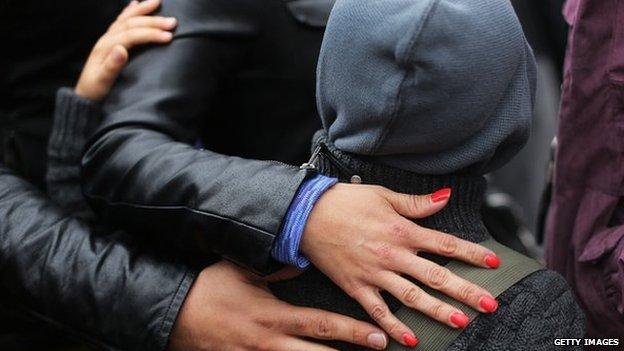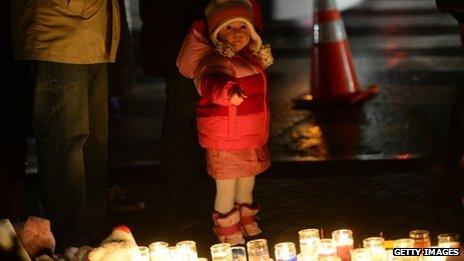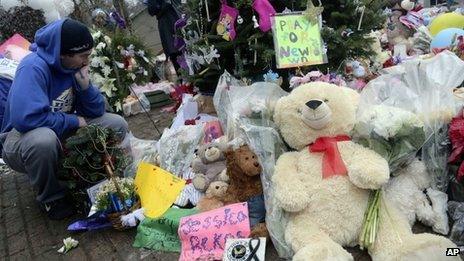Newtown shootings: How do you explain murder to a child?
- Published
- comments

The Connecticut school shootings have shocked the world. How should parents explain the massacre to their children?
It's something that all decent people will struggle to make sense of - the killing of 20 pupils and six adults by a gunman at an elementary school.
But around the world, parents have had to explain the inexplicable to their children.
In an age of rolling news, even the most disturbing tragedies can be impossible for all but the very young to escape.
And given that so many victims of the Newtown massacre were six and seven years old, many parents will feel it's important to reassure their own offspring that they are loved and safe.
KJ Dell'Antonia, the lead writer for the New York Times's Motherlode , externalblog, has four children aged between 11 and six.
She judged their age meant it was impossible to shield them from bad news.
"If my kids were three- or four-year-old pre-schoolers I probably wouldn't have done it," says Dell'Antonia, who lives in Hanover, New Hampshire.

But she felt it was important they learned about the massacre from their mother rather than their classmates, whose accounts might be prone to exaggeration. "I didn't want them to come home and say, 'I heard about this.'"
Dell'Antonia says her approach was to be straightforward and not impose her own reaction on them. "You need to be matter of fact and just answer the questions," she adds.
Talking about it won't traumatise a child, says Richard Meiser-Stedman, a clinical psychologist specialising in childhood trauma.
Children may hear about it and some "thinking it through" is entirely normal for them, he says.
"So they might be worried but they might be more worried if they hear about it and no-one talks about it.
"Children do think about these things. Often they want to understand what is going on in the world, and trying to sweep it under the carpet and pretend things aren't happening is unhelpful."
In Syracuse, New York, clinical neuropsychologist Dominic A Carone, 37, took this approach on Saturday morning when he sat down with his son and daughter, aged seven and eight.
As both a professional and a father, he believed it was important that the children learned about the killings at a time and in a manner of his choosing.
"I said something bad had happened at a school on Friday," he says. "There was a man who shot at people in the school and some of them were killed.
"I told them the mean guy was gone and he's not going to hurt us."
He emphasised that the school was far away from where they lived. If their classmates told them anything about the incident and they were not sure if it was true, he reassured them they could always come to mum and dad.
He chose to be minimalist with the details and let the children ask their own questions if they wanted to know more.
"They had a few but not an excessive amount," he says. "I could tell they were comforted."
Afterwards, he hugged them close.
Having this conversation before bedtime would not have been a good idea, Carone believes.
Instead, he told them first thing in the morning, before a day of family activities - going to a restaurant and a basketball game together - which he says displaced the bad news.
"I'm always amazed by kids," he says. "They take things in their stride."
Of course, not all children will react this way. Others may become upset or dwell on the tragedy.
According to Meiser-Stedman, it's important to stress that an event like this is out of the ordinary.

"Make it clear that what has happened is incredibly extreme, and someone who had a lot of problems did this, but ultimately it is very rare and it is because it is so unusual that it is in the news," he says.
"Parents should be clear and frank, explaining that schools have lots of security measures and they are safe places. But the conversation should be age appropriate, so I wouldn't suggest a one-size-fits-all approach."
In the UK, you could add that it is very difficult to get these guns, says Meiser-Stedman, who is based in Cambridge, England.
Answering the question why? is a more difficult task, he adds, but parents should not be afraid of saying they don't know.
"We don't have all the answers yet [in this case] and as an adult or parent we should be OK with that," he says.
"Mental health problems are very common, so parents should try not to give the impression that anyone with a mental health problem might become a violent killer.
"Rather than saying something like he was mad, which doesn't help, just say this is extremely unusual and the man had lots of problems. I would not second-guess things."
Every child is different. How parents tell their offspring - and, indeed, whether they choose to do so at all - will vary from family to family.
Talking through such a horrifying act will be a difficult task for most parents.
But for many it will be a necessary and important one, too.
Additional reporting by Tom Geoghegan
You can follow the Magazine on Twitter, external and on Facebook, external